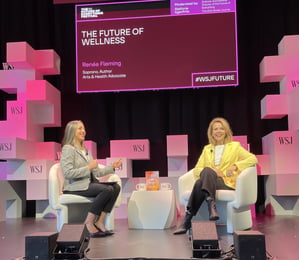I enjoyed attending the Wall Street Journal's Future of Everything Festival in New York City this week.
The event brought leaders from various industries together to share their insights and predictions for the future... of everything. From technology and healthcare to entertainment and education, the festival provided a comprehensive look at the trends and innovations that shape our world.
One consistent theme throughout the festival was AI and its future impact. Every presenter was asked about their views on AI, resulting in a 50/50 mix of optimism and caution. While some saw AI as a revolutionary force with boundless potential, others raised concerns about increased time spent on devices and cybersecurity risks. This diverse range of perspectives set the stage for a thought-provoking and engaging event.
Read on for my key takeaways from
some of the notable speakers:
Bayer CEO: Bill Anderson
Anderson is just celebrating his one-year anniversary as CEO of Bayer, and he is transforming its organizational structure to prioritize customer and employee empowerment. By putting the customer at the center of your hierarchy, you foster a culture of open communication and encourage autonomy among employees. Garden businesses can follow suit by re-centering the management structure to drive innovation, increase efficiency, and meet the evolving marketplace better.
Former Warner Media CEO: Jason Kilar.jpg?width=271&height=231&name=Image%20(4).jpg)
Kilar highlighted the critical importance of adaptability in an ever-evolving market, a highly relevant principle to garden brands. He pointed out Hulu's potential to dominate the streaming industry thanks to its robust adaptability and innovative strategies. As a green industry brand, staying flexible and responsive to changing market conditions and consumer preferences helps your business pivot to new garden trends, such as goth gardening or horticulturist. Plus, I saw him riding the subway later that evening, so he's a natural, down-to-earth guy.
Second City CEO: Ed Wells
Wells offered insights from the world of improv comedy that are surprisingly relevant to our industry. By advocating for the "yes and" principle, Wells highlighted a communication tool that encourages open-mindedness, creativity, and collaborative problem-solving. This approach can help your brand foster innovation and develop more dynamic marketing strategies and product offerings. Additionally, Wells emphasized the importance of building cohesive teams, where the group's success is prioritized over individual achievements. For the green industry, this means creating a workplace culture that values teamwork and collective goals, leading to more effective and harmonious operations.
Future of Higher Ed: Dartmouth President Sian Beilock.jfif)
Beilock introduced highly unusual concepts on college campuses: open dialogue with those with whom you disagree. Dartmouth Dialogues encourages engaging, in-touch conversations and critical thinking. Our businesses can innovate and adapt to changing market conditions by fostering an environment where critical thinking is valued. Additionally, Beilock's emphasis on leaders articulating their "North Star" aligns with the need for brands to have a clear guiding principle or vision. This clarity can drive strategic decisions and ensure the brand remains focused and consistent in its mission, enhancing internal alignment and customer trust.
Whole Foods Former CEO: John Mackey.jpg?width=298&height=206&name=Image%20(1).jpg)
Mackey was my favorite speaker of the whole event. His perspective on distinguishing oneself from one's business resonated with me, as he likened a company to a child you can guide and nurture but cannot ultimately control. This analogy encourages garden brand leaders to balance their personal identity and professional responsibilities, fostering a healthier relationship with their work. Mackey's emphasis on sustainability as a "gift with purchase" is particularly pertinent to garden brands. This concept underscores the necessity of integrating sustainability into every product and innovation, aligning perfectly with the increasing consumer demand for environmentally responsible gardening practices. Mackey's honest, sharp, and experienced viewpoints offer valuable lessons for garden brands aiming to thrive in a competitive and conscientious market.
Soprano Renee Fleming: The Future of Music
Fleming's talk on the transformative power of music in healthcare and wellness holds significant relevance for gardening. She highlighted how music memory is the last to fade, even in patients with severe cognitive decline, and shared how medical environments use music to influence patient behaviors positively. Fleming cited that just 45 minutes of any artistic activity can reduce anxiety by 25%, pointing to a future where music and art, including gardening, play a pivotal role in wellness.
For garden brands, this insight emphasizes the therapeutic and wellness benefits of gardening. Promoting gardening as an artistic and wellness activity can attract customers seeking mental health and relaxation benefits. Integrating these aspects into marketing strategies can help garden brands position themselves as contributors to holistic well-being, appealing to a broader audience interested in the positive impacts of gardening on mental and physical health.
Additional Highlights
The festival had fun touches, a performance by the Broadway stars of The Outsiders, and a private concert by Regina Spektor. It featured cultural icons like Paris Hilton, who shared her perspectives on the future of the influencer.
The insights shared by these industry leaders have inspired new ideas and reinforced the importance of innovation, adaptability, and a customer-centric approach in today's fast-paced world. These lessons will undoubtedly influence our strategies and initiatives as we continue to grow and evolve, especially in our Garden Trends Reports.














